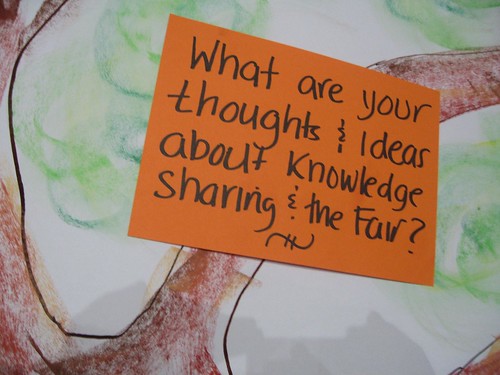
Today was a day of preparation for many involved with the Share Fair. Those of us leading sessions or trainings tomorrow were briefed and continued to reach out to the amazing 160+ people who are sharing the lessons of their KS work. The steering committee and their staff, friends, colleauges (and I suspect in some cases, families) were wrangled into set up duties, helping organize last minute details and convert FAO's huge atrium into the Fair "central" area.
As some of us gathered to prepare a fishbowl session tomorrow on "What is KM and Why does it matter?" we resurfaced so much of what makes knowledge sharing a slippery proposition. Where does it begin and where does it end. I suggested it is so pervasive - or could be pervasive - that it risks being too big to get one's arms around. And that it is easy to talk about in generalities, or worse, platitudes, but indeed when we strategically and intentionally build paths for KS, it can help us not only get our work done, but done better.
The reason?
We live in a complex, interconnected world. We are overwhelmed with data and information. So we need to use both strong and weak ties with others who share end goals to collectively work towards those goals. There is little we can do by ourselves anymore. So KS becomes the blood that pumps through our work. We rely on KS in very close and structured ways to get the work done in our teams. We rely on looser connections and practices to utilize KS across our overlapping networks. And we rely on both of these to stay informed in a fast changing world, filtered through those relationships and networks. I cover this little bit, you cover that little bit and together, we have a better view of the whole.
This truly asks us to rethink how we work. First of all
- We can't keep making KS "something else we add to the list." We need to take a hard look at what we should STOP doing, as well as new practices to add.
- We can't let our outdated institutional systems block KS, particularly old systems that may not have rewarded KS behaviors, strategic plans that have not yet included similar strategic evaluation and inclusion of KS, and the conflict between "taking credit" and the real-world need to work in a networked, cross organizational manner. This is not business as usual.
- We can work both in formal and informal challenges - this is particularly difficult in organizations which by nature are "political." Networks, one of the most powerful tools at our disposal, don't care about institutional boundaries and if our institutions throw up road blocks, networks simply work around the blocks.
- We are at a period of workforce shift and we have the opportunity to both embrace the new ways of those born in the digital era, and a deep (and quickly escaping) opportunity to bridge the knowledge of the large cohort of retiring baby boomers. We need both sets of talents. KS can be a key enabler.

No comments:
Post a Comment